-
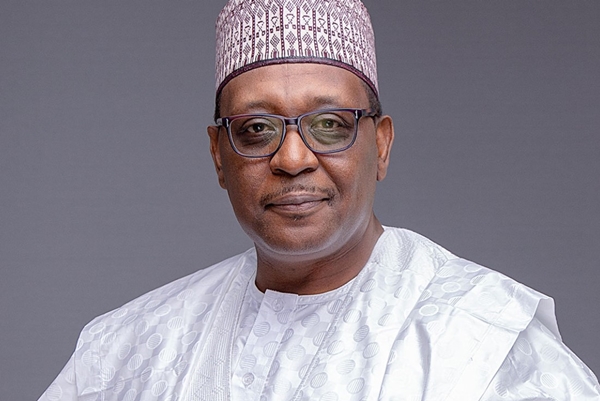
Dr. Muhammad Ali Pate to become next CEO of Gavi, the Vaccine Alliance
Feb 13, 2023Gavi, the Vaccine AllianceGavi, the Vaccine Alliance announced today the appointment of Dr Muhammad Ali Pate as its new Chief Executive Officer. Dr Pate will be officially starting as CEO on 3 August 2023. A proven global health leader with experience at the national and international levels, Dr Pate will lead Gavi as it continues its work to support routine immunisation, outbreak response and COVID-19 vaccinations around the world.Dr Muhammad Ali Pate, who was selected following a yearlong recruitment process personally overseen by the Chair of the Gavi Board, Professor José Manuel Barroso, will bring a wealth of experience to the role. A medical doctor trained in both internal medicine and infectious diseases, with an MBA from Duke University in the United States, Dr Pate served as Nigeria’s Minister of State for Health between 2011 and 2013. In this role, he led a flagship initiative to revive routine vaccinations and primary health care, chaired a presidential taskforce to eradicate polio and introduced new vaccines into the country.While serving as Global Director for Health, Nutrition and Population of the World Bank and Director of the Global Financing Facility at the World Bank between 2019 and 2021, he led the Bank’s US$ 18 billion COVID-19 global health response and represented the Bank on various boards, including those of Gavi, the Global Fund, CEPI and UNAIDS. He is currently the Julio Frenk Professor of Public Health Leadership at Harvard Chan School of Public Health and has served on several health-focused boards and expert panels in the public, private and not-for-profit sectors during his career.Commenting on the appointment, Professor Barroso said: “Dr Muhammad Ali Pate stood out in a field of world-class candidates. With his knowledge and experience of both national immunization programming and international emergency response and global finance, I am confident that Gavi will continue to build on its vision and mission, as well as navigate the many challenges and opportunities we will face.”Dr Pate, whose appointment was confirmed today at an extraordinary meeting of the Gavi Board, said: “I’m deeply honoured to be joining Gavi as its incoming CEO. Gavi is one of the most impactful organisations in global health, a testament to the great work of the Alliance partners and Secretariat staff. It will be my privilege to lead it, building on the work of Dr Seth Berkley, and continue to support countries to scale up critical routine immunisation programmes, reach more zero-dose children, expand access to new vaccines, transform primary health care systems, and help fight outbreaks and future pandemics.”Sitting CEO Dr Seth Berkley has led Gavi for more than half of its existence, making it a centrepiece within the global health landscape, including recently co-establishing COVAX to serve countries during the unprecedented COVID-19 pandemic, having so far shipped nearly 1.9 billion COVID-19 vaccine doses to 146 countries. Since Dr Berkley took the helm in 2011, the Alliance has averted 11.8 million future deaths (compared to 4.5 million between 2000 and 2010); and has helped immunise more than 676 million children – more than double the 305 million children reached between 2000 and 2010.Thanks to Dr Berkley’s vision for health equity, Gavi has added a number of new vaccines to its portfolio during his tenure, including for HPV, polio, cholera and malaria, and in its current strategy cycle is focusing on reaching zero-dose children across marginalised communities. The Alliance also played an increasingly influential role in emergency response, developing vaccine stockpiles for diseases such as cholera and introducing innovative financing mechanisms to fund emergency purchase of Ebola and COVID-19 vaccines. The economic result of Gavi’s expansion of activities during his tenure has been profound, unlocking over US$ 160 billion of economic benefits compared to US$ 24 billion in its first ten years.Commenting on Dr Pate’s appointment, Dr Berkley said: “Leading Gavi and helping the Alliance to continually surpass itself in terms of saving lives, protecting children and supporting countries during global health emergencies has been the greatest honour of my career. I am proud and humbled to have been part of what the Alliance has achieved, and I am confident in its future under Muhammad’s leadership: having worked with him during his time as Minister and at the World Bank, I know he understands intimately the landscape we work in and will be uncompromising in his drive for public health equity.”Dr Berkley will continue to serve as CEO until 2 August 2023, while working with incoming CEO Dr Pate to ensure a smooth transition.
-
- 2,158
-
- 2 March 2023
-
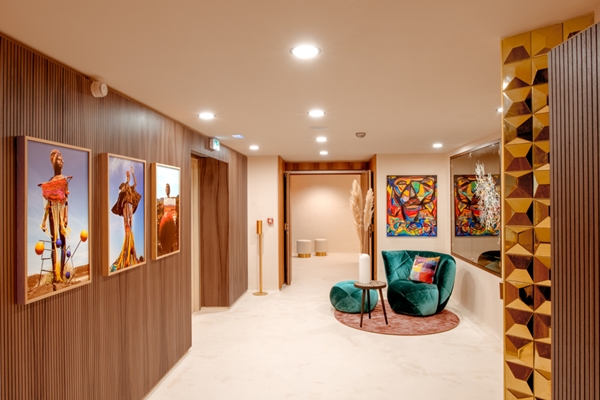
The addresses dedicated exclusively to women to know in 2023 in Paris : Heimat club by Waris Dirie
Jan 20, 2023Vogue France“Proud Female Fitness” is the credo of Heimat by Waris Dirie. Meaning “home” in German, Heimat has teamed up with model Waris Diris to bring this brand new private fitness club to life in the former Dapper Museum dedicated to African art. Enough to highlight this link between art and sport dear to the top Somali who participated in the curation and the benevolent atmosphere of this space spread over 4 floors. Thanks to a monthly subscription system, women find themselves in this cocoon where the practice of sport is supervised by attentive coaches, more than 50 various group lessons (cardio, boxing, dance, fitness, etc.), three rooms with state-of-the-art equipment (including the Kinesis machine, one of the only two available in Paris) as well as a basement dedicated to relaxation with a jacuzzi and sauna area or even a protein smoothie bar (and cocktails for the end of the day). Most ? Scattered around the venue, works of art by African female artists are all for sale and the proceeds will go to the Waris Dirie Desert Flower Foundation which fights against excision.
-
- 3,710
-
- 2 March 2023
-
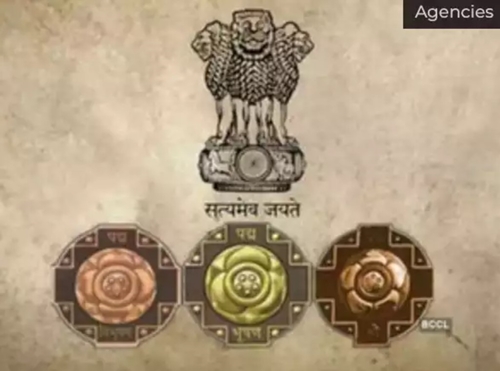
Padma Awards 2023: List of Science and Engineering Recipients Named for Civilian Awards
Jan 26, 2023KnownewsThe Government of India has announced the list of Padma Award winners for the year 2023. The Padma Awards are one of India’s highest civilian honors held annually on the eve of Republic Day. The awards are presented in three categories: Padma Vibhushan (for exceptional and outstanding service), Padma Bhushan (distinguished service of a higher order) and Padma Shri (distinguished service). The award is intended to recognize achievement in any field of activity or discipline involving an element of public service.Padma Awards, which were established in the year 1954, are announced every year on the occasion of Republic Day, except for short breaks in the years 1978 and 1979 and 1993 to 1997.This year’s list consists of 10 names from science and technology. Shir Srinivas Varadhan is awarded the highest civilian honor Padma Vibhushan. Shri Deepak Dhar received Padma Bhushan, while eight people received Padma Shri in science and engineering.Laureates1. Padma VibhushanShri Srinivas Varadhan – Science & Technology – United States of America2. Padma BhushanShri Deepak Dhar – Science and Engineering – Maharashtra3. Padma ShriShri Khadar Valli Dudekula – Science and Engineering – KarnatakaShri Modadugu Vijay Gupta – Science and Engineering – TelanganaShri Ganesh Nagappa Krishnarajanagara – Science and Engineering – Andhra PradeshShri Arvind Kumar – Science and Engineering – Uttar Pradeshprof. (Dr.) Mahendra Pal – Science & Engineering – GujaratShri Bakshi Ram – Science and Engineering – HaryanaMs. Sujatha Ramdorai – Science and Engineering – CanadaShri Abbareddy Nageswara Rao – Science and Engineering – Andhra Pradesh
-
- 3,318
-
- 2 March 2023
-
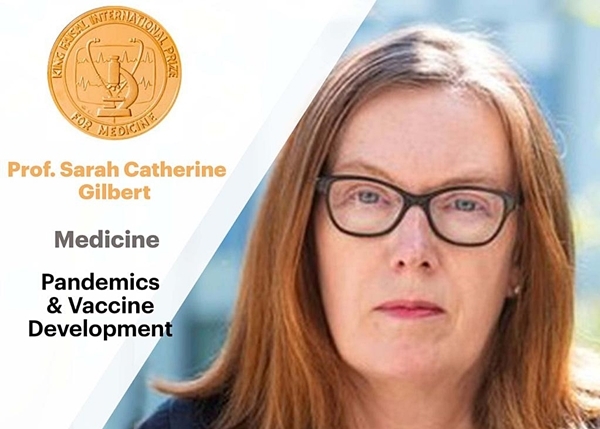
Two Female Scientists Win this year’s King Faisal Prize
January 04, 2023GlobeNewswireJeddah, Saudi Arabia, Jan. 04, 2023 (GLOBE NEWSWIRE) -- Two women scientists were announced King Faisal Prize for Medicine and Science laureates for 2023: a Covid-19 vaccine developer and a nanotechnology scientist. Six others were announced King Faisal Prize laureates for having enriched humanity with key and invaluable achievements and discoveries in the fields of Medicine, Science, Arabic Language & Literature, Islamic Studies, and Serving Islam. The woman behind Oxford–AstraZeneca COVID-19 vaccine, Professor Sarah Gilbert, the Saïd Chair of Vaccinology in the Nuffield Department of Medicine at Oxford University, was selected to receive King Faisal Prize in medicine. She has co-created the vaccine which has been in use in more than 180 countries saving billions of lives due to its efficiency, low cost and accessibility.The vaccine is called “ChAdOx1 nCoV-19” and was achieved in 10 months of work using a novel approach. Instead of the traditional vaccines’ method which uses a weakened or killed form of the original infection and requires a long time to develop in the human body, Gilbert genetically modified a weakened version of a common virus which caused a cold in chimpanzees to be injected in humans without causing an infection. This modified virus became the essence of the vaccine developed by Dr. Gilbert against coronavirus carrying the genetic instructions for the coronavirus spike protein. When entering the body cells, the virus uses a genetic code or instructions to produce the specific surface spike protein of the coronavirus inducing an immune response and preparing the immune system to attack coronavirus if it infects the body.Dr. Gilbert’s innovative vaccine technologies used lately for COVID-19 were also applied by her to Malaria, Ebola, Influenza, and MERS, with clinical trials of the latter taking place in the UK and in the Kingdom of Saudi Arabia. She also worked on developing a medicine for it. In fact, the patented ChAdOx1 technology was developed by Dr. Gilbert and other researchers at the University of Oxford in 2012. In 2014, she led the first trial of an Ebola vaccine after a large outbreak of the disease in West Africa. It was because of the ChAdOx1 technology and her accumulated research that the Oxford–AstraZeneca COVID-19 vaccine was produced so quickly.The other woman scientist selected to receive King Faisal Prize in science is Professor Jackie Yi-Ru Ying; the A*STAR Senior Fellow and Director at NanoBio Lab, Agency for Science, Technology, and Research.Jeddah, Saudi Arabia, Jan. 04, 2023 (GLOBE NEWSWIRE) -- Two women scientists were announced King Faisal Prize for Medicine and Science laureates for 2023: a Covid-19 vaccine developer and a nanotechnology scientist. Six others were announced King Faisal Prize laureates for having enriched humanity with key and invaluable achievements and discoveries in the fields of Medicine, Science, Arabic Language & Literature, Islamic Studies, and Serving Islam. The woman behind Oxford–AstraZeneca COVID-19 vaccine, Professor Sarah Gilbert, the Saïd Chair of Vaccinology in the Nuffield Department of Medicine at Oxford University, was selected to receive King Faisal Prize in medicine. She has co-created the vaccine which has been in use in more than 180 countries saving billions of lives due to its efficiency, low cost and accessibility.The vaccine is called “ChAdOx1 nCoV-19” and was achieved in 10 months of work using a novel approach. Instead of the traditional vaccines’ method which uses a weakened or killed form of the original infection and requires a long time to develop in the human body, Gilbert genetically modified a weakened version of a common virus which caused a cold in chimpanzees to be injected in humans without causing an infection. This modified virus became the essence of the vaccine developed by Dr. Gilbert against coronavirus carrying the genetic instructions for the coronavirus spike protein. When entering the body cells, the virus uses a genetic code or instructions to produce the specific surface spike protein of the coronavirus inducing an immune response and preparing the immune system to attack coronavirus if it infects the body.Dr. Gilbert’s innovative vaccine technologies used lately for COVID-19 were also applied by her to Malaria, Ebola, Influenza, and MERS, with clinical trials of the latter taking place in the UK and in the Kingdom of Saudi Arabia. She also worked on developing a medicine for it. In fact, the patented ChAdOx1 technology was developed by Dr. Gilbert and other researchers at the University of Oxford in 2012. In 2014, she led the first trial of an Ebola vaccine after a large outbreak of the disease in West Africa. It was because of the ChAdOx1 technology and her accumulated research that the Oxford–AstraZeneca COVID-19 vaccine was produced so quickly.The other woman scientist selected to receive King Faisal Prize in science is Professor Jackie Yi-Ru Ying; the A*STAR Senior Fellow and Director at NanoBio Lab, Agency for Science, Technology, and Research.
-
- 1,883
-
- 11 January 2023
-
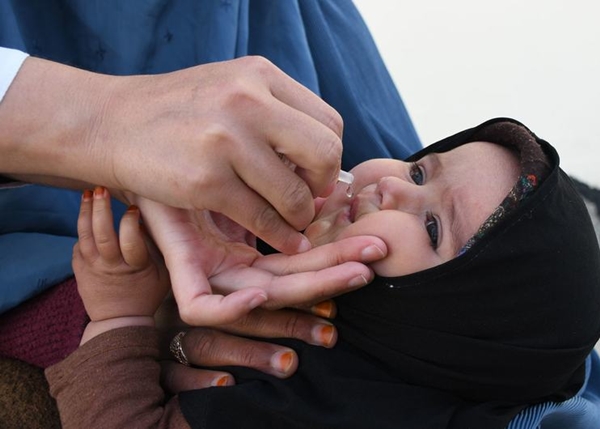
Millions of Afghan children inoculated against measles, polio in 1st Statewide drive since 2021 t...
December 22, 2022UN NewsMillions of Afghan children have been vaccinated during the first nationwide integrated measles and polio campaign in Afghanistan since the Taliban took power in August 2021, the UN health agency said on Thursday.Afghanistan has vaccinated 5.36 million nine- to 59-month old children against measles while 6.1 million infants to 59-month-olds received oral polio vaccine during the vaccination drive held from 26 November to 12 December.Based on the data from Afghanistan’s Ministry of Public Health Expanded Programme on Immunization, the campaign covered 329 districts in all 34 provinces of the country – with 4,341 vaccination teams comprised of four members on each team.“It warms my heart that we were able to protect Afghan children from measles and polio as we enter the harsh winter season in the country”, said Luo Dapeng, the World Health Organization (WHO) Representative in Afghanistan.“I thank all the health workers, partners and donors who made this possible”.
-
- 1,807
-
- 11 January 2023
-
![[‘Greet Dad and sleep well’ — Akinwumi Adesina loses mum] We want to give our deepest condo... 썸네일](http://sunhakpeaceprize.org/data/bbsData/16733964889.jpg)
[‘Greet Dad and sleep well’ — Akinwumi Adesina loses mum] We want to give our deepest condo...
December 22, 2022Independent Nigeria Eunice Adesina, the mother of Akinwumi Adesina, president of the African Development Bank (AfDB), is dead.Adesina announced her demise in a tweet on his official Twitter handle on Thursday.She died at the age of 92.“My darling mother, Eunice O. Adesina passed away today at the age of 92. I am blessed you were my mother,” he wrote.“You gave birth to me, nursed me, cared for and brought me up. I am forever grateful Mum. So long sweet Mum, greet Dad and sleep well. I love you. Your loving baby, Akins.”Roland Adesina, the father of the AfDB president, died on March 28, 2018.The AfDB president had also tweeted about his father’s death at the time and described him as his best friend.“My darling father and best friend, Roland F. Adesina, passed away yesterday morning. I wouldn’t have been who I am today without your love and sacrifice. Thanks for sending me to school and being a role model. Rest in peace my very dear senior Ombros!” he wrote.
-
- 1,983
-
- 11 January 2023
-
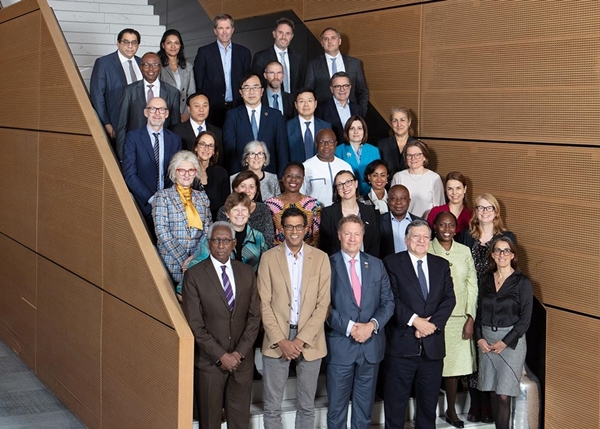
Hello, 2023: Gavi’s Board votes in a plan for the coming year
December 9, 2022 GAVI NewsAfter two days of heavy discussion in Geneva, Switzerland, the Gavi Board has voted its approval of a bold suite of strategy decisions – a plan of action that prompted Chair of the Gavi Board José Manuel Barroso to hail 2023 as a \"Year of Renewal\".If that phrase rings with determined confidence, it might be because these last pandemic years have brought with them both hard-won successes and worrying setbacks.The Board agreed, in principle, to explore integrating the COVID-19 jabs into Gavi’s core programming. The aim here is to help lift the burden on country health programmes of running specialised emergency immunisation programmes, and move towards a sustainable new normal.In 2021, Gavi-supported countries delivered a larger volume of life-saving vaccines than ever before, with more than 65 million children reached with routine vaccines in addition to the more than two billion COVID-19 vaccines administered in Gavi-supported countries.And yet, in consequence of COVID-19\'s many disruptions, the world entered 2022 with millions more vaccine-unprotected \"zero-dose\" children than it had in 2019. Global coverage with three doses of diphtheria, tetanus and pertussis-containing vaccine (DTP3) – the conventional measure for vaccine coverage in general – fell by four percentage points in 2020 and a further one percentage point in 2021.This is ground that must be regained. \'Renewal\', then, means both catching up losses and pressing ambitiously forward. Here are six ways Gavi will be doing that in 2023:1. Doubling down on essential immunisationMaking sure children have access to life-saving routine vaccines no matter where they live has been at the heart of Gavi\'s mission since the organisation was founded at the turn of the millennium. The upshot of its efforts so far? An estimated 16.2 million future deaths averted and child mortality halved in 73 lower-income countries.But there\'s a lot more to do. And, since the pandemic hobbled many national immunisation programmes, the world is now engaged in an urgent game of catch-up – the stakes of which are spotlit by the aberrant numbers of large-scale, life-threatening measles outbreaks the world has recorded this year alone.A renewed focus on routine immunisation and reaching zero-dose children, new vaccine introductions, a strengthened Alliance role in outbreak and pandemic preparedness and response, alongside continued COVID-19 vaccinations in lower income countries, is the basis of Gavi\'s next-period strategy, the Board has reaffirmed.2. Finding missed-out zero-dose childrenRenewing core commitments doesn\'t mean business as usual. Finding completely unvaccinated, hard-to-reach zero-dose children and bringing them under the shelter of the immunisation umbrella has been a core priority of Gavi\'s fifth strategic period, inaugurated in 2021, and which will reach its halfway point in 2023 (the evolution of the Gavi 5.0 strategy just endorsed by the Board is being called 5.1).The urgency of this work couldn\'t be clearer: Pre-pandemic analyses suggest nearly 50% of vaccine preventable deaths occur among zero-dose children. Two-thirds of these children live in extremely poor households suffering from multiple deprivations, including lack of access to reproductive health services, water and sanitation.It\'s a workstream that – in making vaccination blind spots its target – runs on innovation. The Zero-Dose Immunization Programme, or ZIP, a programme that launched this year, which serves kids in some of the most fragile cross-border zones on the planet, offers one example of the kinds of fresh approaches and partnerships that will channel Gavi\'s transformative efforts into 2023.3. Driving new vaccine introductions: HPV and moreThe human papillomavirus (HPV) vaccine has the power to prevent 70–90% of cervical cancer cases – a disease which currently finds about 90% of its more than 340,000 annual victims in lower and middle-income countries (LMICs). Today, just 12% of people worldwide, and 9% of people in Gavi-supported countries, have been immunised against the cancer-causing virus.That\'s about to change. This week, the Board has green-lit an injection of US$ 167 million for the relaunch of Gavi\'s HPV vaccine programme, for a total investment of more than US$ 600 million. By 2025, the Alliance is planning to reach more than 86 million girls with the vaccine, which will translate to an estimated 1.4 million future deaths averted.Other vaccines that will receive beefed-up Gavi support in the next period include the world\'s first generation of malaria vaccines, and the inactivated polio vaccine (IPV), a critical component of the global polio end-game.4. In principle, mainstreaming COVID-19 vaccines into Gavi\'s core programmesOther potential additions to the Gavi stable of vaccines are the COVID-19 jabs that have been saving lives worldwide for the past two years. While COVAX has a plan to cover the worst-case scenario – a major worldwide resurgence of the pandemic, including associated deaths – the Board agreed, in principle, to explore integrating the COVID-19 jabs into Gavi\'s core programming. The aim here is to help lift the burden on country health programmes of running specialised emergency immunisation programmes, and move towards a sustainable new normal.This approval in principle by the Board will help Gavi engage with countries and partners on what shape a future programme would take, while also remaining flexible in case of further developments in 2023.5. Helping grow vaccine manufacturing outside the Global North – especially in AfricaThe pandemic made it clear: concentrating the capacity to make vaccines in just a couple of global regions leaves the rest of the world at elevated risk. Gavi\'s Board has voted \'yes\' on a plan to step up and support regional institutions to create sustainable vaccine-manufacturing hubs in, particularly, Africa, which currently fulfils just 0.1% of global supply.The African Union has declared an intention that the continent should develop, produce and supply more than 60% of its own vaccine needs by 2040. For both global health equity and resilience, Gavi has pledged to help.6. Preparing for the next pandemicYou\'ve heard it by now: the question isn\'t if, it\'s when. Amid climate change, population growth, urbanisation, pressure on wildernesses and human migration, the chance of a COVID-19 scale pandemic breaking out has increased to an estimated 2% in any given year. At this very moment, the world is faced with no fewer than three WHO-declared Public Health Emergencies of International Concern (PHEICs): polio, mpox and COVID-19.If it wasn\'t clear before, it has certainly became evident during the COVID-19 pandemic that Gavi\'s decades of experience in responding to outbreaks gives the organisation an important position in the global landscape of pandemic preparedness and response (PPR). The Board voted this week to prioritise strengthening health systems in readiness for a major epidemic threat and working towards equitable access to outbreak and pandemic vaccines.
-
- 2,190
-
- 14 December 2022
-
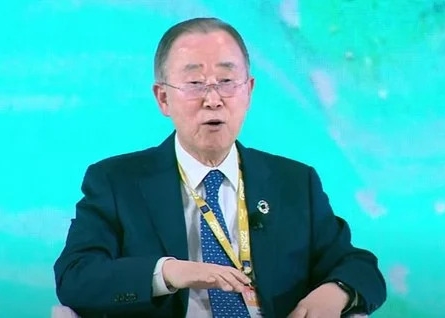
Businesses need to be more involved to reach UN goals on poverty and hunger: Ban Ki-moon
Nobember 29, 2022Arab NewsRIYADH: UN goals on ending poverty and eradicating hunger by 2030 are set to be missed as governments, businesses, and civil societies are not working properly together, according to the organization’s former secretary-general.Speaking at the World Travel and Tourism Council Global Summit in Riyadh on Nov. 29, Ban Ki-moon said that it is extremely unlikely the world will achieve all 17 sustainable development goals within the next eight years.Other targets include quality education, gender equality, clean water and sanitation, and affordable and clean energy.“It is almost impossible to achieve our 17 sustainable development goals by 2030, instead it may go beyond 2053. For African countries, it may go up to 2060,” said Ki-moon.He added: “The 17 SDG goals demand global partnerships between governments, business companies and civil societies. When this trilateral partnership starts working, then I think we can do it.”During his talk, he also highlighted the importance of having global collaboration and cooperation between governments to achieve sustainability goals.“Geopolitical tensions including the illegal ongoing Russian aggression on Ukraine represent one of the most dangerous moments for global security in decades. I am deeply concerned that world leaders are not united,” he added.Ki-moon further noted that the travel and tourism sector can play a crucial role in uniting the world.“The travel and tourism sector has a crucial role to play in ensuring cross-border collaboration, which will result in a peaceful and sustainable future, underpinned by justice, solidarity and prosperity,” Ki-moon added.Citing a UN World Food Program report, the former Secretary General warned that there will be at least 1.9 billion people who will be suffering from poverty, famine, and starvation by 2023.He went on and said that climate change is burning the earth, and humans will witness a sixth mass extinction in the next 100 years if sufficient climate actions are not taken.“Our planet is on fire, both literally and figuratively as the climate crisis is deepening with surging temperatures, raging floods, and rising sea levels. Climate change is approaching much faster than one may think,” said Ki-moon.He pointed out that business communities, with the help of governments, can play a pivotal part in changing the future of planet Earth.“Business communities can change the world in a better manner by investing wisely, thus achieving sustainable development goals and also helping implement the Paris climate agreement,” he said.
-
- 1,670
-
- 8 December 2022
-
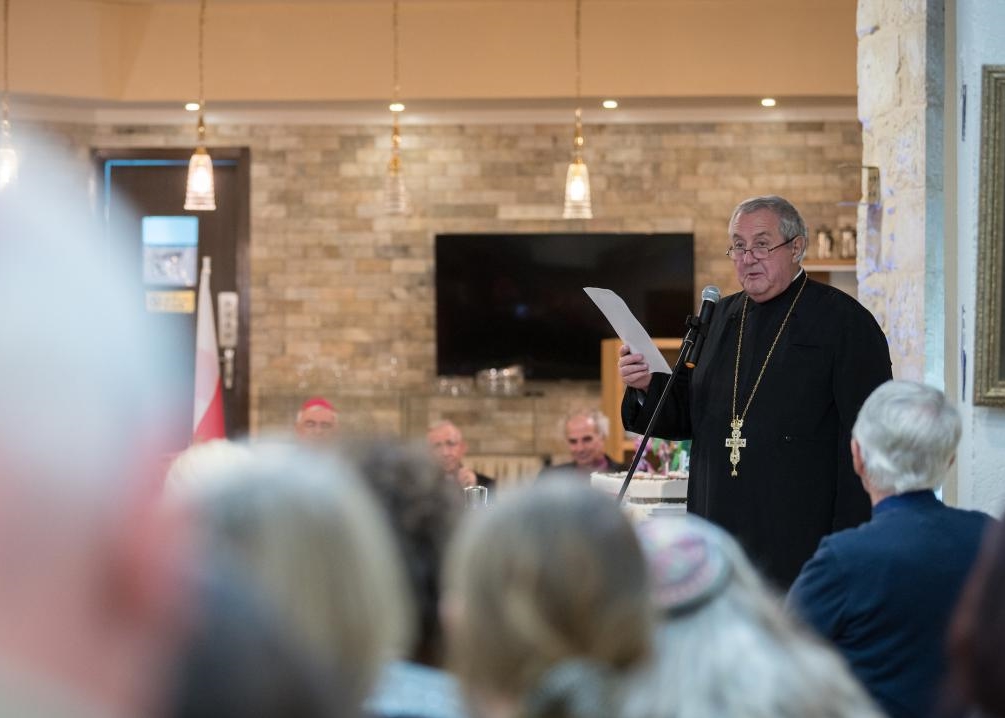
Ecumenical Accompaniment Programme in Palestine and Israel commemorates 20-year anniversary: 1,80...
23 November 2022World Council of ChurchesHeads of churches in Jerusalem, World Council of Churches leaders, partners, and friends gathered in Jerusalem to commemorate the 20-year anniversary of the Ecumenical Accompaniment Programme in Palestine and Israel.Ecumenical Accompaniment Programme in Palestine and IsraelWhile they commemorated 20 years of a programme that has given children and adults an added sense of security, they lamented that today’s circumstances in the Holy Land mean that accompaniment is still needed now more than ever.Nearly 100 guests gathered at Hotel Imperial in Jerusalem to meet, greet, and listen to local stories. Among the guests were heads of churches, member churches, ecumenical partners, Ecumenical Accompaniers, and Ecumenical Accompaniment Programme in Palestine and Israel national coordinators.The event was opened by His Eminence Archbishop Aristarchos of Constantina and WCC acting general secretary Rev. Prof. Dr Ioan Sauca. Among the speakers were also Ecumenical Accompaniment Programme in Palestine and Israel national coordinators; Ecumenical Accompaniers; Bishop Ibrahim Azar, Evangelical Lutheran Church in the Holy Land and Jerusalem; and Rt. Rev. Dr Munib Younan, bishop emeritus of the Evangelical Lutheran Church of Jordan and the Holy Land.Sauca shared expressions of both joy and concern during his reflections on the occasion.“The worldwide ecumenical fellowship has always sought to be in active solidarity with the Christians of the Middle East, who are living in continuation of an unbroken line of faithful Christian witness in the multi-religious contexts of their countries, making vital contributions to the vibrant diversity and development of their societies,” said Sauca.“Upheavals, violent extremism using religion as justification, ongoing military occupations, discrimination and systematic violations of human rights, economic crises and corruption, absence of the rule of law, and other factors have contributed to an existential crisis for all in the region.”Sauca noted that this is particularly affecting vulnerable communities, including Christians who are facing displacement and mass migration.“We affirm that the best means of averting this threat is equal rights, inclusive citizenship, justice and dignity for all, without religious or racial discrimination,” he said.In 2002, the WCC founded the Ecumenical Accompaniment Programme in Palestine and Israel in response to a call by church leaders in the Holy Land.“The WCC, whose member churches represent about 580 million Christians worldwide, answered the call,” he said. “Earlier in 2002, residents of the small village of Yanoun were driven out of their homes by high levels of settler violence.”Israeli and international peace activists took action and decided to live in the village of Yanoun, hoping that the village residents would find it safe to come back. “Due to the protective presence provided by these activists, the residents of Yanoun were able to return,” Sauca recalled.This success served as inspiration and in 2002 the Ecumenical Accompaniment Programme in Palestine and Israel was born. WCC member churches have since recruited over 1,800 Ecumenical Accompaniers from 25 countries to serve 3-month terms in placements around the West Bank.Working closely with local communities, Israeli and Palestinian human rights groups, and international agencies, the programme has maintained a constant presence in the region ever since. WCC acting general secretary Rev. Prof. Dr Ioan Sauca shared expressions of both joy and concern during his reflections at the opening of the event in Jerusalem. Photo: Albin Hillert/WCCAnniversary greetings from far and wideThose who have worked with and supported the Ecumenical Accompaniment Programme in Palestine and Israel over the years took time to offer greetings and share memories about the programme.Bishop Dr Munib Younan, former president of the Lutheran World Federation, said that the idea of the programme is to “promote justice, peace and reconciliation in Palestine and Israel—and in the whole world.Younan added: “We have only to trust this God of justice. That’s my hope to the world.” Salpy Eskidjian, Office of the Religious Track of the Cyprus Peace Process, said that the situation on the ground in Palestine and Israel has not improved as they hoped 20 years ago—but has only changed.“The presence—as long as the member churches and as long as the local community feels it’s important—I would pray that the international, wider global ecumenical family would continue that protective presence,” she said. “It is really a joy that brings thankfulness and gratitude.”Over the years, many photos depict Ecumenical Accompaniers serving as a peaceful protective presence for Palestinian children walking to school.Eskidjian added that she hopes the programme continues to grow and continues make a difference in people’s lives.“My hope is a place where the two peoples and all faith communities would live together in peace,” she said.Sara Speicher, deputy general secretary of the World Association for Christian Communication, also recalled the days when the programme was first conceived. “The idea was first of all seen as and welcomed by the heads of churches and local Palestinian and Israeli groups as a tangible sign of the WCC’s concern but also hope that this accompaniment would show some solidarity, that it would give some security, and that it would raise awareness.”Sam Bahour, managing partner, Applied Information Management, Palestine, said ecumenical accompaniment is a lifesaving and life-changing experience. “This is saving lives because many times a foreign presence will be a deterrent for the Israeli occupying power or the illegal Israeli settlers to interfere with our daily lives.”Rev. Dr Owe Boersma, Referent Ecumenical Networks & Organizations, Bread for the World, said he considers the programme a success in exposing people in different contexts to the reality of the occupation and to work toward the end of it.“Unfortunately, the jubilee of 20 years coincides almost exactly with 55 years of occupation,” he said.Manuel Quintero Perez, former Ecumenical Accompaniment Programme in Palestine and Israel coordinator, recalled the verse in 1 Corinthians, Chapter 12 that speaks about suffering.“When somebody suffers, the whole body suffers with it,” Perez said. “It was most excellent that WCC responded by organizing this programme, thereby allowing churches from many countries to be part of the suffering of the churches in the Holy Land,” he said.In the land where Jesus was born, we have so much hatred, Perez continued, and peace is a long-term process. “My only hope is that the ecumenical community will continue working with people there to find that solution.”WCC general secretary-elect Rev. Prof. Dr Jerry Pillay shared reflections as well.“Despite the hardship of Palestinians in the Holy Land, and that of the youth in particular, God remains the only constant in everything, and is the compass that guides us to our aspired goal,” he said. “Whatever we do in the struggle for justice, our concrete action should be seen as directed toward social transformation.” In other words, there needs to be a vision of an alternative society, Pillay suggested. “What does this mean in the context of the Israel-Palestine conflict?” he asked. “We have to continue on our joint pilgrimage of justice, reconciliation, and unity.”Carla Khijoyan, WCC programme executive for Peace Building in the Middle East, said that the occupation is not only illegal but unethical as well. “And just as there are moral dimensions of this conflict, there is a moral imperative for us as churches and Christians for how we respond,” she said, adding that serving as an Ecumenical Accompanier “is a lesson of resilience and resistance, of hope and dignity and integrity—a lesson that changes us forever.”
-
- 1,777
-
- 30 November 2022
-
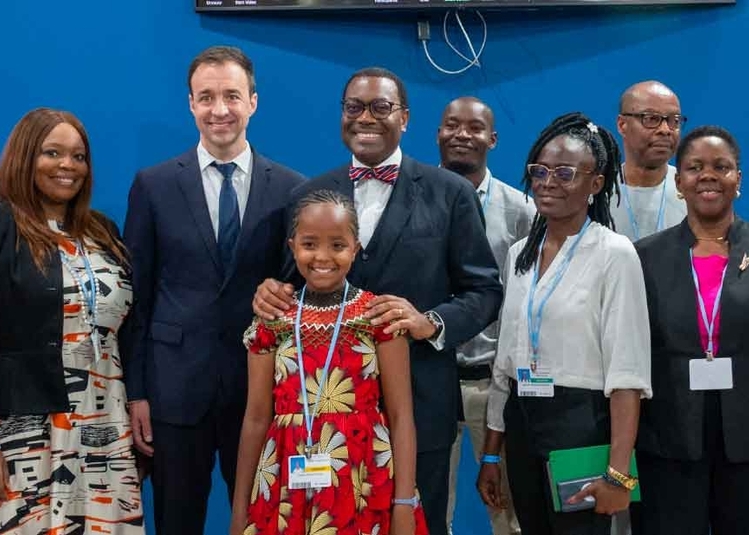
$2 million in prizes awarded at COP27 to African youth-led businesses
November 11, 2022African Development Bank GroupTwenty African youth-led enterprises have won grant funding of up to $100,000 each in this year’s African Youth Adaptation Solutions Challenge (YouthADAPT) competition. In addition to the grant, each winner benefits from a 12-month accelerator program to help them grow their businesses, deepen their impact and create decent jobs.The annual competition and awards program for youth-led enterprises—which is 50% women-led—is jointly organized by the Global Center on Adaptation, the African Development Bank and Climate Investment Funds (CIF). The program is part of the Africa Adaptation Acceleration Program YouthADAPT flagship pillar(link is external).The program boosts sustainable job creation by supporting entrepreneurship and youth-led innovations in climate change adaptation and resilience across Africa. The competition invites young entrepreneurs and micro, small, and medium-sized enterprises in Africa to submit innovative solutions and business ideas that can drive climate change adaptation and resilience.Speaking at the awards ceremony, African Development Bank Group President Dr. Akinwumi Adesina, said: “Africa’s needs cannot be ignored. The youth must be at the center of everything we are doing about climate change. No young person is too young to engage in climate dialogue. Our young people must be part of the solution. They are creative, dynamic, and engaging. They are futuristic and must be part of the solution for climate adaptation in Africa.“We want the youth to speak for Africa and develop solutions for the continent. For this initiative last year, we supported 10 youth-owned and youth-led businesses in Africa with $1 million. This year, we are supporting 20 businesses with $2 million. So, we can expect that next year, we will double efforts to $4 million dollars. That’s the way it’s going to go for Africa.”Adesina observed that 80% of the winners’ businesses were in agriculture. He said: “Agriculture is the future of Africa. As you know, that has been my gospel for many decades. The lowest bar is for Africa to feed itself. The high bar is for Africa to feed the world. Agriculture is a business. I encourage our young people to do three things: Create, Adapt and Prosper. CAP for short.”Norway’s Minister of International Development Anne Beathe Tvinnereim commended the enthusiasm that the competition generated among the youth. She said it is important to tailor climate solutions that could be scaled up for the various communities. “That is where the youth of Africa come in – you see the problem; you see the solutions and you have the energy and the resources to deliver and we want to help you with that,” She said. She commended the African Development Bank and the Global Adaptation Center for creating the initiative.Professor Patrick Verkooijen, CEO of the Global Center on Adaptation spoke about the impact of the award on one of last year’s winners, Juveline Ngum Ngwa from Bamenda in Cameroon who was able to scale up her business, Bleglee Waste Management. As a result of last year’s grant, she was able to open a second waste sorting factory and has developed further software for her drones which identify garbage which is blocking drainage systems.He remarked: “Adaptation is good business. But it needs to be at scale. And that is exactly what the Africa Adaptation Acceleration Program – the AAAP – does. The AAAP is mobilizing $25 billion over five years to scale up and accelerate adaptation climate adaptation actions across Africa. And one of its four pillars is the YouthADAPT flagship program.”The winning enterprises of the Youth Adaptation Solutions Challenge 2022 come from all parts of the continent. Half are female led. They are scaling innovations in critical social and economic sectors affected by climate change. These include agriculture, waste management, water resources and sanitation, renewable energy and energy efficiency.The 2022 winners of the African Youth Adaptation Solutions Challenge are:· Flushh, Namibia· Green Impact Technologies, Malawi· AgriTech Analytics, Kenya· Baramoda, Egypt· Cassavita, Cameroon· Ecobarter, Nigeria· Farmer Lifeline Technologies, Kenya· Grocircular Agro Services, Nigeria· IRIBA Water Group Ltd, Rwanda· Mpatsa Engineering Company Limited (formerly Sustainable Water Irrigation and Farming Technologies), Malawi· Viva Organica, Botswana· Voltx for Engineering & Industries, Egypt· West African Feeds, Ghana· Kisumeo Organics Limited, Kenya· Agroexpert farming, Senegal· Eurl Algerienne Des Industries Technologiques, Algeria· Lono, Côte d\'Ivoire· Pazelgreen Technologies, Nigeria· Akatale On Cloud, Uganda· Multi-Tech Sustainable Solutions (MTTS), CameroonProgram organizers received 3,000 applications for this year’s competition. The top 50 were shortlisted to pitch their innovations before a jury.
-
- 1,766
-
- 24 November 2022
-
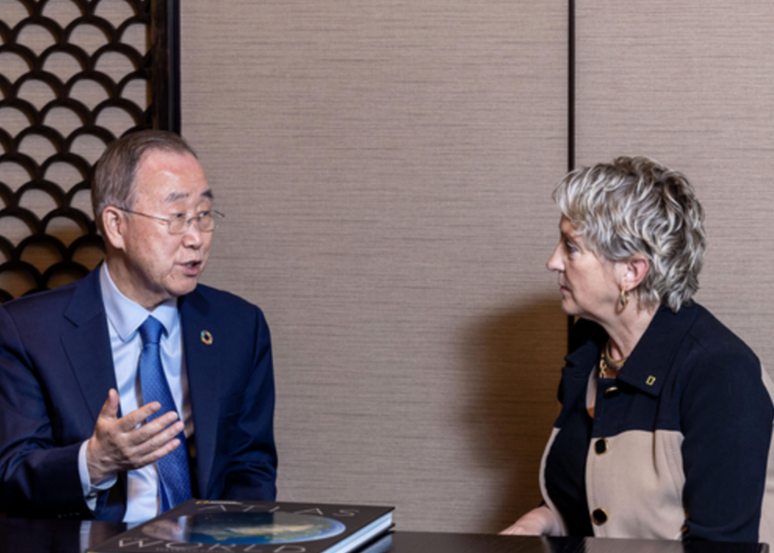
National Geographic Society CEO, Ban Ki-moon explore ways to save planet
November 7, 2022Korean Joongang DailyJill Tiefenthaler, CEO of the National Geographic Society, stressed the need to empower “change makers” on the front lines of the climate crisis, including scientists, educators and the media to deal with the “planetary emergency.” “Both climate change and biodiversity loss are the two biggest threats that we face in our world,” said Tiefenthaler in an interview with the Korea JoongAng Daily and JoongAng Ilbo at the Westin Josun Hotel in central Seoul on Oct. 17. Earlier that day, Tiefenthaler had a luncheon meeting with former UN Secretary General Ban Ki-moon, president of the Seoul-based Global Green Growth Institute (GGGI) and chairman of Ban Ki-moon Foundation for a Better Future. “We need to treat the climate and ecological emergencies as one planetary emergency”During their talks, Ban and Tiefenthaler focused on challenges facing the world including combatting climate change, achieving the UN Sustainable Development Goals (SDGs) and supporting women in science. “We need to treat the climate and ecological emergencies as one planetary emergency,” said Tiefenthaler. “They are two sides of the same coin. Global leaders, businesses and individuals can no longer address the climate and biodiversity crises separately.” Ban pointed to extreme weather events occurring in many parts of the world. He noted that Britain was a country that does not need air conditioning even in summer, but temperatures there exceeded 40 degrees Celsius this summer. In China, a drought caused water levels to drop in the Yangtze River, while in Pakistan, a third of the country was submerged in historic flooding this summer. “If we do not overcome the climate crisis, the frequency and intensity of natural disasters will increase,” said Ban. “In the face of such natural disasters, there are also apocalyptic predictions that the time of the sixth mass extinction will come about, when humans will become extinct.” The importance of addressing climate change should not get lostThe National Geographic Society is a non-profit scientific and educational organization founded in 1888 to increase geographic knowledge. It has a joint venture with the Walt Disney Company, the National Geographic Partners, which oversees commercial activities related to National Geographic, such as magazines and television channels. Tiefenthaler, an economist, comes from academia and previously served as the president of Colorado College and provost of Wake Forest University. She became the first woman CEO of the National Geographic Society in 2020. She said in her talks with Ban, they discussed “making sure that climate change and the importance of addressing it doesn’t get lost” amid other challenges that the world is facing including “geopolitical issues.” The National Geographic Society Asia Foundation was established in Korea 2015 to support Asian explorers and their research. During her visit to Seoul, Tiefenthaler met with 25 explorers from across the Asia-Pacific at the National Geographic Society Women’s Convening event.Original article: https://koreajoongangdaily.joins.com/2022/11/06/national/environment/National-Geographic-Society-CEO-Jill-Tiefenthaler/20221106200827128.html
-
- 1,852
-
- 24 November 2022
-
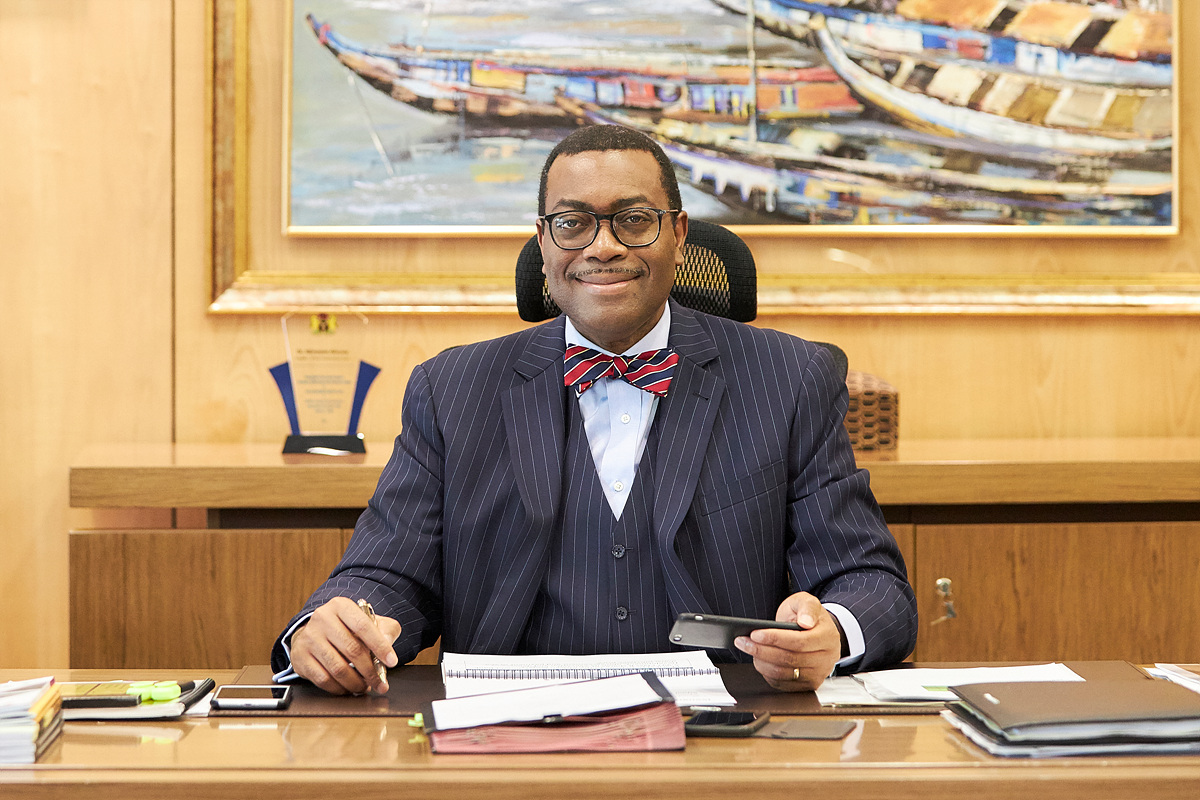
African Development Bank secures $31 billion at investment forum
November 5, 2022ReutersThe African Development Bank raised $31 billion in investment commitments for projects during the Africa Investment Forum, said the bank’s president Akinwumi Adesina at the end of the three-day meeting on Friday.It brings the total investment for the year to about $64 billion, said Adesina. The bank secured $32.8 billion at another meeting with investors in March.Adesina gave few details about the projects but said one focus would be agricultural processing zones.Projects announced earlier in the year were from sectors including agriculture and agro-processing, education, energy and climate, healthcare, minerals and mining, and information and communications technology.
-
- 1,798
-
- 24 November 2022
- Sunhak Peace Prize
-
Future generations refer not only to our own physical descendants
but also to all future generations to come.Since all decisions made by the current generation will either positively
or negatively affect them, we must take responsibility for our actions.

